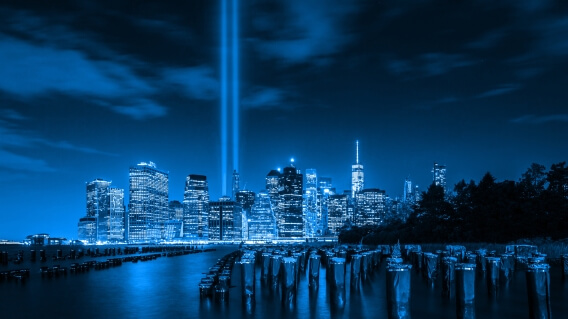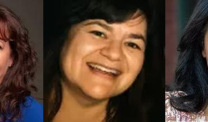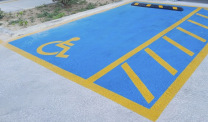Reflecting on the 20th Anniversary of 9/11
Awareness & ResearchWritten by Dr. Raja Michael Flores | Edited By Walter Pacheco

Twenty years after 9/11 – the day that changed our country forever – I feel stronger than ever about taking care of the heroes who put their lives on the line for all of us. It’s still a priority for me.
Nearly 3,000 innocent people were killed that day, more than 2,600 in and around the World Trade Center. Another 6,000 people were injured. And since that day, more than 3,500 people have died from 9/11-related illnesses.
Most of these tragic losses stem from the harmful substances released into the air when the Twin Towers fell, covering the city in a cloud of carcinogens.
Unfortunately, those numbers will continue to climb for decades more. For some of the resulting cancers in the aftermath, such as lung cancer and malignant mesothelioma, we’ve only scratched the surface of what’s to come.
Treating 9/11 Survivors
Roughly half a million people were exposed to toxic substances such as asbestos on 9/11 and in the months that followed. That includes the police officers, firefighters, EMTs, officials and civilians who worked tirelessly to help with rescue and recovery, as well as all of the families living, working and attending school within the radius of the blast and within the radius of the dust cloud that lingered over the city.
From a surgical perspective, I see some of these patients every month, mainly for cancers and pulmonary diseases like sarcoidosis.
With 9/11, we’re at the 20-year mark, but just the very beginning of some cancers we’re starting to see. It will be another eight to 10 years before it peaks.
We’re seeing a real disproportionate amount of autoimmune diseases in the 9/11 population. That’s a direct result of the exposure.
With mesothelioma, it could be even further out. It’s such a rare cancer, and we’ve seen so few cases to this point. The latency period with asbestos disease is typically 20-60 years. It’s coming, though.
At this point, it’s important for anyone who was there to be proactive with their health care. The World Trade Center Health Program has done a good job taking care of people.
Preventative screening measures are so important. For those exposed, we advise annual low-dose CAT scans, hoping to detect any abnormalities early when they can be more easily treated.
I still consider it a privilege to spend time with these patients and help them get through this. It’s far from over, and there is so much more we can do.
Remembering and Honoring Sept. 11
When I speak with patients who are surviving the ongoing effects of 9/11, it always sends me back to that dreadful day and the weeks that followed. Things you’ll never forget.
Like a lot of New Yorkers who remember that day, seeing planes overhead, hearing a fire alarm test, etc. can trigger flashbacks and leave me checking for where the nearest exit is. I still get a little PTSD, and I wasn’t at Ground Zero.
I was at Memorial Sloan Kettering when the planes struck. I had two cases of pleural mesothelioma on my surgical schedule that day. I can still remember the names of the patients, and their families. I can remember them like it was yesterday.
We had just finished the first one, a biopsy, and I was getting ready to do the second one, a major extrapleural pneumonectomy. Suddenly we were told we had to cancel it. I turned on the TV and couldn’t believe what I was seeing.
I’ve heard people ask if the memory of 9/11 is fading, but for those who were there, for those who lost loved ones, it will never go away.
The most emotional time for me, a memory I’ll never forget, was a candlelight ceremony throughout the city a week after 9/11. I was walking home from working at the hospital, heading down into Midtown. So many people were out there with candles.
People had photos and were asking others if they’d seen their loved ones. They were just looking for hope for their family member or friend who hadn’t been found. It was heartbreaking. I remember walking from 68th Street to 38th Street that evening crying the whole way.
When I see the first responders and recovery workers in the clinic today, I just think of them as very special people. They knew there were risks at Ground Zero, that they could be inhaling harmful substances. But they still rushed to take care of their fellow man and kept showing up to recover the fallen.
They are the best of us, and now we must take special care of them.
On a Mission to Help
There’s a tie between 9/11 and what I’m attempting to do now as a mayoral candidate here in New York City. I want to help those who sacrifice themselves to take care of others.
A lot of what I’m seeing now with how hard hospital teams are working to fight the COVID pandemic reminds me of the spirit of care after 9/11. And I worry for our heroes then and our heroes now.
About half of the people who work at our hospital now, for example, who are taking excellent care of patients, live in government-run public housing.
Our hospital is the No. 1 employer in East Harlem. At the height of the first wave of the pandemic in New York, they were coming to work each day, putting their lives on the line.
They were fighting to keep things going and to help others in need. Then, at the end of the day, they would go home to substandard housing and unsafe conditions.
They are exposed to asbestos, fungus and mold. Children are being exposed to lead. Unsafe conditions throughout the government housing is the norm. And that’s not right.
No one is standing up for these people. Many lived in public housing, which put them at increased risk. Eddie, working in the hospital cafeteria; Marge, one of our techs; and a couple of nurses – they all contracted COVID and died.
We’re hurting the people who are taking care of us. That’s not right. That’s why I decided to run for mayor – to help those who are helping others, giving of themselves.
I see it too often with patients coming in with problems related to the unsafe conditions where they live. As a surgeon and candidate, my goal is to help these preventable cases.
I grew up in this city. I care about our future and our families.
Dr. Raja Flores previously wrote about the state of cancer in 9/11 first responders and survivors in 2019.






